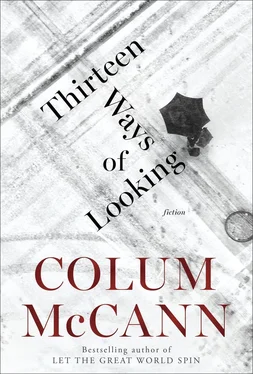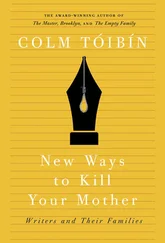— Are you sure you’re all right, Beverly?
— You’re hardly wrapped up at all.
— You must be freezing.
She watches as Sister Anne adjusts the rearview mirror.
— What’s that you were saying?
Sister Anne’s rosary beads click against the steering wheel as she guides the car into the road.
— Oh, nothing really. My mind wanders sometimes. Forgive me. Frío. I think I said it’s cold.
The two elderly nuns lock eyes in the mirror a moment. She glances away, grateful for the silence, until Sister Anne reaches forward to put NPR on the radio: a drone attack in Afghanistan, a typhoon in the Philippines, a wildfire in Australia.
The car slides through the quiet Long Island town, the small boutiques, the coffee shops, the travel agency, the flower arrangement store, the pastelería.
—
THE HOUSE IS a recent gift to the Church. It has not yet been fully renovated, or consecrated, so it is still a place of mirrors. She sees herself everywhere. One in the front hallway, gilded and ornate, catching the reflection of the front steps, so that, at the doorway, one seems to be coming and going at the same time. A mirror, too, at the top of the winding stairs, near the Sacred Heart, with a fresh vase of flowers beneath it. A series of oil paintings along the corridor, with glass frames, so that at the wrong angle she can catch sight of herself as she moves along. In her bathroom there is another mirror which runs the length of the wall.
She thought first of obscuring it entirely, draping it with a cloth, but did not want to be rude, it was simply best to ignore, let it be.
Beverly stands pale, white, naked, scarred. She turns quickly from the mirror, steps into the shower, pulls the sliding door across. The water pumps cold at first and then the heat deepens. A strong pulse of water at her stomach, her shoulders, her neck. She applies the conditioner, rinses, holds, stands back once more, soaps her feet, her toes. Puts her head against the fresh cool tile of the wall. Feels the last drips fall down upon her back.
She steps out on the cold floor, turbans a towel around her head. After he bit her breast, he stitched it crudely himself, pulled the flap of it together and shoved a heated needle into it, pulled the medicated thread through. Wrapped up a bottle of antiseptic, ribboned it, gave it to her like a gift. When it became infected, he took her to the camp infirmary where they ripped her breast open again. He didn’t go near her for weeks afterward. Twice she cut it open herself just to keep him at bay.
—
WITH HER BACK TO THE MIRROR, she towels herself off and dresses. The late news. The last moments of the day. The world at its least consoling. The dark falling outside. Everything moving toward sleep, or its lack. The elderly Argentinian sisters half-doze on the couch together. A copy of Clarín spread out in front of them. Trays and teacups. Magazines. The carpet has not been fixed, but the armchairs have been scooted forward to cover the cigarette burns. How was it that she didn’t even notice? Not just once but twice. So reckless. She could have burned the whole place down. She cannot even remember lighting up.
A pulse of need whips through her. They say it is the most addictive drug of all. She will go tomorrow to the local pharmacy. Nicotine patches. Chewing gum. A matter of willpower.
She likes it here with her elderly Sisters, the informality, the openness, the sense that so much of their work has been done, that now it is time to sit back and watch time unfold, to pray in the face of the sorrows to which the world is still bound.
She watches the Sisters stir, both of them sitting up as if roped to one another.
— Can we watch the…a ver las noticias?
— Sí, sí, por que, no?
A report on the disappearance of the jaguar species in the Amazon. A mine collapse near Valparaiso. News of the elections in Guatemala. Toward the end of the news there is a small report of the London conference — minimal progress in the talks, something about narco-traffic, mining rights, a timeline for further peace talks in Havana — but there is no sight or mention of Carlos.
She should check the Internet, but for all these years she has managed to avoid it, leave it in the background, she is not even sure how to use it: the prospect is mildly terrifying.
— Demasiada tristeza, says Sister María, rising from her chair.
— Buenas noches.
Beverly watches as the two elderly women climb the stairs, shadow to shadow, their cardigans twined.
She waits all the way through the second repeat of the program, just in case. Ridiculous. As if the repeat might change itself and he might somehow appear, changed once again.
Has he become a man of peace somehow? Has he offered his cheek, Lord? Has he turned himself around? How many other things run counter to the life he once had? Who is he now? An elegant man in a blue shirt? A participant at a peace institute? What accident of circumstance brought the conference to London? How did he manage to shuck his past?
Only once she saw him almost crack. At the safe house near Puerto Boyacá. The windows were sealed and blackened. Whatever light came in crept under the door. Vague sounds from outside the door. A distant radio. She tried to remember old poems, prayers, psalms, even the way the words looked on the page. He unchained her and brought her a glass of coconut milk. She had no idea why. He came across the hard dirt floor. A slight limp. He wore black laced boots, his camouflage trousers tucked into them. A sheathed knife dangled from his belt. He kneeled down in front of her. His eyes heavy-lidded and brown. His cheeks unshaven. The flashlight stung her momentarily. She drew away. Carlos put one hand on the back of her neck and tilted her chin with his forefinger and had her drink: the milk was cool, though there was no fridge in the house. She could feel the coolness, a whole childhood of it, falling through her. Rain on the coral beach in Galway. White tennis balls on the broken court. Her brother at his shortwave radio. A nest of wires and voices. Her father’s cattle huddled on a laneway. The broken church bell. A grass verge of green in the laneway. High windows. Too tall for the school chairs. The milk came in small silver cans. She would not cry or whimper. She had always refused him that. Carlos sat back against the wall and looked at her, his own lip quivering. She thought the milk to be the harbinger of some abuse — a punch to the ear, the knife to the throat, a heave against the wall — but he simply fed it to her, then drank from the same glass, muttered something that sounded like an apology, and left, closed the thick steel door behind him. A little rim of light leaked under the door.
—
IT IS TWO IN the morning by the clock on the DVD when she rises for bed. She shuffles across the kitchen floor, reaches to switch off the outdoor porch light. The ashtray still hangs there, the tin can moving ever so slightly in the breeze.
Beverly opens the screen door. The ashtray has not been emptied. She tilts it. The odor is foul.
She walks the length of the porch in the hard cold. The stars out, nailheading the night. A few clouds drifting. The trees shaped against the dark. She squeezes her thumbs against her forehead once more: To abase the self in such a way, no, I cannot. I must resist.
An alarming silence. There was a while in Saint Louis, years ago, when she simply could not stand to be outside: the very sound of insects drilled into her.
She reaches deftly into the bucket, smooths the crush from a misshapen cigarette, lights up.
On the lawn, a sudden square of light falls from an upstairs window, like the frame of a painting thrown onto the ground. She finishes the cigarette in three hard draws.
Читать дальше












